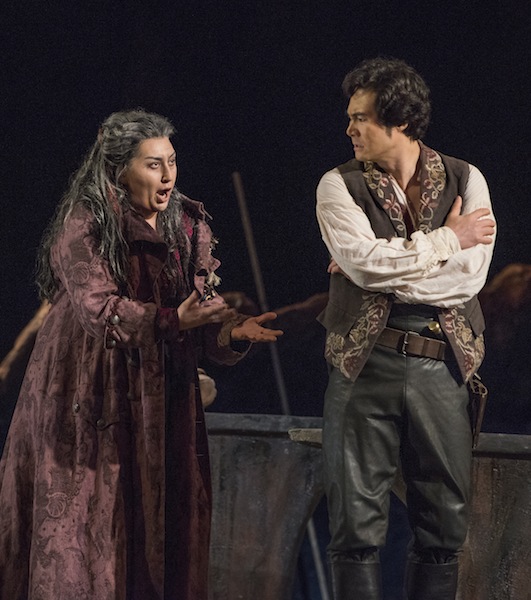Low voices soar high in Met’s brooding “Trovatore”

Anita Rachvelishvili and Yonghoon Lee in Verdi’s “Il Trovatore” at the Metropolitan Opera. Photo: Karen Almond
In the Metropolitan Opera’s strong revival of Il Trovatore Monday night, it wasn’t the title character and his paramour who took the spotlight. This performance, rather, was dominated by the two troubled antagonists who use the leading couple as props in their own revenge drama.
It makes sense, in a way. Verdi’s classic melodrama revolves around curses, mistaken identities, fratricide, suicide, and ancient grudges; who better to drive the performance than Azucena and Count di Luna, the two vivid characters who set it all in motion?
For years, the Met has had a go-to mezzo-soprano for the gypsy Azucena, in company veteran Dolora Zajick (who will in fact be singing one performance later in the run). They may have found a new one in Anita Rachvelishvili. This is hardly the Georgian mezzo’s first outing at the Met—she’s played several Carmens since her 2011 debut—but this was by far her most complete performance with the company to date.
When she took the stage in Act II for “Stride la vampa,” she unleashed the kind of forceful, energetic sound that can make even the drowsiest listener sit up straight. This was a gripping portrayal from the moment she stepped on, with a laser intensity in her eyes and in her delivery to match the throbbing, burning power of her voice. There was never a break in the consistency of her sound: from the rich smolder of her chest voice to her penetrating top, she maintained a focused, vigorous tone.
Rachvelishvili gave the sort of star performance on Monday that can be a major inflection point for a career, showing an unswerving commitment to her portrayal that came through in her searing vocal characterization. After this Azucena, it’s easy to imagine her in other dramatic mezzo roles; Don Carlo’s Eboli would be a perfect fit.
As her foil, Quinn Kelsey was a marvelous, brooding Count di Luna. Listed as a baritone, he sounded more like a basso cantante in Monday’s performance, bringing an enormous voice with a deep, woody, rough-grained sound. This was not quite the sort of smooth, caressing vocal performance we often get from more lyric Verdi baritones in this role, yet his instrument is flexible enough to sing the role’s flowing lines. To hear familiar arias like “Il balen del suo sorriso” sung with such weight cast the music in a new light. Just hearing Kelsey was terrifying, and his glowering demeanor and imposing presence made him a fearsome villain.
Tenor Yonghoon Lee gets more secure with every outing at the Met, and his performance as Manrico was, on the whole, excellent. He’s settled in now as a reliable tenor with a consistent, muscular sound and clarion top, and gives a passionate delivery of every role he takes on. On this occasion, attempts at pointless hairpins and excessive high pianissimos did not serve him well; but to the extent that he stayed away from overly precious phrasing, this was an impressive outing.
Jennifer Rowley, after several promising appearances at the Met recently, took a step back in Monday’s performance. She was engaging in her first attempt at Leonora, but her voice sounded overwhelmed by the part: pushing herself to find more vocal weight, she only succeeded in smothering her cool, bright soprano with a colorless wobble. Rowley eventually warmed up, but in “Tacea la notte placida,” her top was shrill and there was little body to her middle voice. She deserves some forbearance, having stepped in for Maria Agresta with only two weeks’ notice, so one can hope that she’ll settle in as the run continues.
Štefan Kocán strutted imperiously as di Luna’s lieutenant, Ferrando, offering a commanding presence and a heavy, gravelly voice. Sarah Mesko made an endearing Ines, warm and tender with her dark-hued mezzo.
Marco Armiliato had the Met Orchestra in fine voice, and while his reading of the score was by-the-book, he provided ideal support for the singers. Many of the evening’s highlights, as a result, were trios or ensemble numbers, where his pacing helped maintain the thrill of the music. Donald Palumbo’s choristers were in top form, blaring forth with bright power in the famous “Anvil” chorus.
Even with such sterling performances as Monday’s, the 2009 production by David McVicar is growing stale—it’s walls, gates, and more walls, rotating grandly on the stage’s main turntable without really showing much of an atmospheric difference between one scene and the next. The staging has its moments of swashbuckling fun, such as the sight of the rebels scaling the gate at Leonora’s convent to surprise di Luna and his men, but grappling with the drama of the work is left entirely up to the principals.
Il Trovatore runs through February 15 at the Metropolitan Opera. Luca Salsi takes over the role of Count di Luna and Kwangchul Youn takes over the role of Ferrando beginning February 6. Dolora Zajick appears as Azucena on February 6. metopera.org






